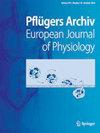一个模型的教训:2型糖尿病早期胰高血糖素功能障碍。
IF 2.9
4区 医学
Q2 PHYSIOLOGY
Pflugers Archiv : European journal of physiology
Pub Date : 2025-02-01
Epub Date: 2025-01-08
DOI:10.1007/s00424-024-03062-4
引用次数: 0
摘要
本文章由计算机程序翻译,如有差异,请以英文原文为准。
Lessons from a model: early glucagon dysfunction in type 2 diabetes.
求助全文
通过发布文献求助,成功后即可免费获取论文全文。
去求助
来源期刊
CiteScore
8.80
自引率
2.20%
发文量
121
审稿时长
4-8 weeks
期刊介绍:
Pflügers Archiv European Journal of Physiology publishes those results of original research that are seen as advancing the physiological sciences, especially those providing mechanistic insights into physiological functions at the molecular and cellular level, and clearly conveying a physiological message. Submissions are encouraged that deal with the evaluation of molecular and cellular mechanisms of disease, ideally resulting in translational research. Purely descriptive papers covering applied physiology or clinical papers will be excluded. Papers on methodological topics will be considered if they contribute to the development of novel tools for further investigation of (patho)physiological mechanisms.

 求助内容:
求助内容: 应助结果提醒方式:
应助结果提醒方式:


